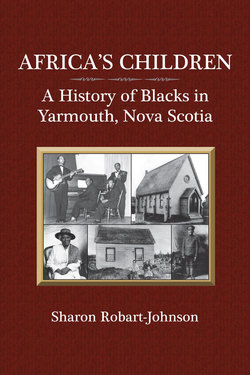Читать книгу Africa's Children - Sharon Robart-Johnson - Страница 8
На сайте Литреса книга снята с продажи.
ОглавлениеFOREWORD
In March 1997, I moved to Yarmouth, Nova Scotia. This was not a move that I could have conceived possible prior to my joining the RCMP. I had grown up in Halifax, and had only been in Yarmouth twice in my life. Both times it was a quick trip: come to town, participate in the event, and get back on the road to Halifax. Since taking up residency in 1997, things have changed.
I now look at Yarmouth in an entirely different light than when I first arrived. Now, Yarmouth is like a second home (which isn’t entirely strange) because there are several other RCMP members who, upon their retirement, have chosen to call Yarmouth home. It just has that effect on you.
What I was exposed to in Yarmouth was a rural way of thinking, and the confirmation that these communities are often overlooked by metro Halifax and the province at large. In times of crisis and concern, financial commitments by government are often made to funding initiatives that target the city, even though many of the same concerns are being voiced in other rural areas of the province. Drop-out rates among African Nova Scotian learners and unemployment are two issues that mirror that of the larger urban centre. But when funding announcements are made, rural Nova Scotia and in particular, rural Black Nova Scotia, doesn’t seem to be on the radar screen. Consequently, there is an “us and them” mentality that exists and, when one is not “at the table,” one becomes an afterthought.
If this “us and them” mentality still exists today, then what about those days gone by, when the miles between point A and point B didn’t include the Trans-Canada Highway? At least in those days regional resources were still bountiful, and the sea and soil were the way in which most earned their living. And yet in those times it was still a larger struggle for Black folks to prosper. But survive they did, and their survival spirit still lives on today.
Yarmouth has a rich African–Nova Scotian history that includes all that is Canada. There have been contributions to the military, as there were individuals from Yarmouth who have served in both World Wars as well as the Korean War. There were those who served as members of the No. 2 Construction Battalion during the First World War and those who helped to liberate Holland during the Second World War. There have been athletes, entrepreneurs, artists, civil servants, and law enforcement: Percy Fenton, Ernest Johnson, Les Sykes, Leroy “Greenville Flash” Lawrence, Calvin Lawrence, Bruce Johnson, and Clarence Bodden. Contributions to community service can be viewed through the lives of Ada Fells, who served as a regional member of the Black United Front and the Black Cultural Society of Nova Scotia, and Deaconess Jeanette Johnson, of the Greenville United Baptist Church, who displayed the indelible faith that has sustained Black folks in Nova Scotia since they first stepped foot onto the shores of what was then New France. These are but a few of the names who have shaped and molded the Black experience in Yarmouth.
When I met Sharon Robart-Johnson, it was clear that she was interested in Black history and culture. She recognized the gaps in our history and what little the public knew about it. She told me about several large stone walls that had been built by Black slaves on the McKinnon property in Argyle called McKinnon’s Neck (some of the slaves are believed to be buried on the McKinnon property), and the indignities that were endured by those who, upon their deaths, weren’t regarded important enough to have their names recorded in the funeral home’s ledger.
Sharon talked about the three cemeteries in Greenville and how she would like to see an acknowledgment of some kind erected to mark their place in history. Sharon felt that it was extremely important that succeeding generations of all Canadians should know this history. More importantly, she went about seeking out and compiling this forgotten history for all to see and learn from, both the struggles and the triumphs.
In a time and space when we as African–Nova Scotians are still counting firsts as a measure of our progress, I applaud Sharon’s contribution to the African-Canadian experience.
Craig Marshall Smith
Yarmouth, Nova Scotia
